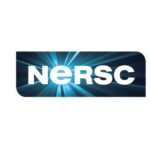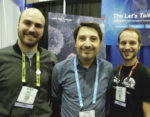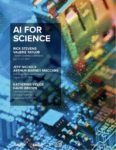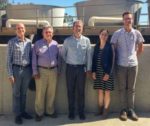Lawrence Berkeley National Laboratory has announced that national lab and university researchers recently released two papers introducing new methods of data storage and analysis to make quantum computing more practical and exploring how visualization helps in understanding quantum computing. “This work represents significant strides in understanding and harnessing current quantum devices for data encoding, processing, and visualization,” […]
LBNL Researchers to Be Presented Hans Meuer Award at ISC 2024
Hamburg, Germany, March 22 – This year’s Hans Meuer Award recipients are a team of five researchers from the Lawrence Berkeley National Laboratory for their evaluation of the classical HPC hardware requirements for large-scale quantum computations. The Hans Meuer Award is an annual award presented at ISC High Performance. It recognizes the most outstanding research paper […]
IBM Reports Accurate Quantum at 100+ Qubits
IBM (NYSE: IBM) today announced what the company said is a breakthrough in quantum computing, published on the cover of the scientific journal Nature, demonstrating for the first time that quantum systems can produce accurate results at a scale of 100+ qubits “reaching beyond leading classical approaches.” An IBM research team conducted an experiment that […]
NERSC RFP: 40 ExaFLOPS Mixed Precision Expected from Perlmutter AI Supercomputer Successor
Last August, NERSC (the National Energy Research Scientific Computing Center) at Lawrence Berkeley National Laboratory announced its intent to commission “NERSC-10,” a next-generation supercomputer to be delivered “in the 2026 timeframe” for the U.S. Department of Energy Office of Science research community. The system will succeed Perlmutter, the 6,000 NVIDIA GPU-powered (with AMD CPUs), 4-exaFLOPS […]
NERSC, ALCF, Codeplay Partner on SYCL GPU Compiler
The National Energy Research Scientific Computing Center (NERSC) at Lawrence Berkeley National Laboratory (LBNL) and Argonne Leadership Computing Facility (ALCF) are working with Codeplay Software to enhance the LLVM SYCL GPU compiler capabilities for Nvidia A100 GPUs. The collaboration is designed to help NERSC and ALCF users, along with the HPC community in general, produce […]
Podcast: WarpX exascale application to accelerate plasma accelerator research
In this Let’s Talk Exascale podcast, researchers from LBNL discuss how the WarpX project are developing an exascale application for plasma accelerator research. “The new breeds of virtual experiments that the WarpX team is developing are not possible with current technologies and will bring huge savings in research costs, according to the project’s summary information available on ECP’s website. The summary also states that more affordable research will lead to the design of a plasma-based collider, and even bigger savings by enabling the characterization of the accelerator before it is built.”
Argonne Publishes AI for Science Report
Argonne National Lab has published a comprehensive AI for Science Report based on a series of Town Hall meetings held in 2019. Hosted by Argonne, Oak Ridge, and Berkeley National Laboratories, the four town hall meetings were attended by more than 1,000 U.S. scientists and engineers. The goal of the town hall series was to examine scientific opportunities in the areas of artificial intelligence (AI), Big Data, and high-performance computing (HPC) in the next decade, and to capture the big ideas, grand challenges, and next steps to realizing these opportunities.
MLPerf-HPC Working Group seeks participation
In this special guest feature, Murali Emani from Argonne writes that a team of scientists from DoE labs have formed a working group called MLPerf-HPC to focus on benchmarking machine learning workloads for high performance computing. “As machine learning (ML) is becoming a critical component to help run applications faster, improve throughput and understand the insights from the data generated from simulations, benchmarking ML methods with scientific workloads at scale will be important as we progress towards next generation supercomputers.”
LBNL Breaks New Ground in Data Center Optimization
Berkeley Lab has been at the forefront of efforts to design, build, and optimize energy-efficient hyperscale data centers. “In the march to exascale computing, there are real questions about the hard limits you run up against in terms of energy consumption and cooling loads,” Elliott said. “NERSC is very interested in optimizing its facilities to be leaders in energy-efficient HPC.”
Exascale Computing Project Announces Staff Changes Within Software Technology Group
The US Department of Energy’s Exascale Computing Project (ECP) has announced the following staff changes within the Software Technology group. Lois Curfman McInnes from Argonne will replace Jonathan Carter as Deputy Director for Software Technology. Meanwhile Sherry Li is now team lead for Math Libraries. “We are fortunate to have such an incredibly seasoned, knowledgeable, and respected staff to help us lead the ECP efforts in bringing the nation’s first exascale computing software environment to fruition,” said Mike Heroux from Sandia National Labs.












